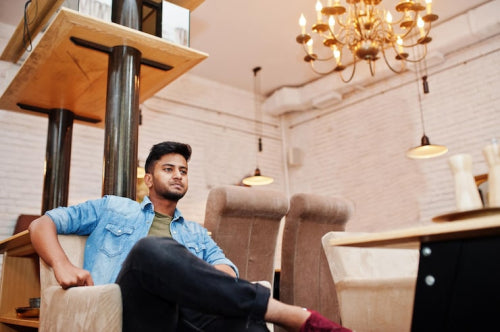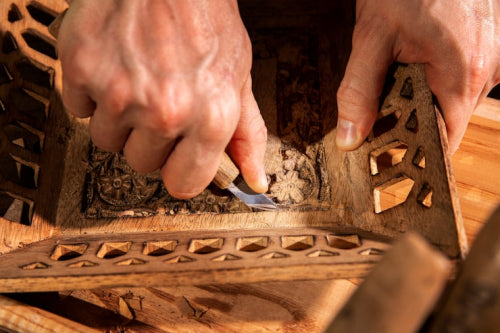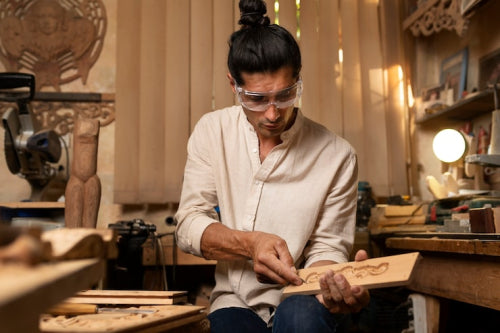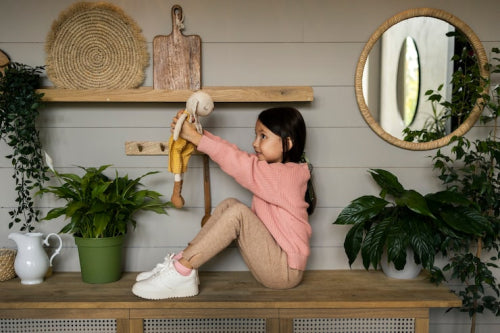Quick Listen:
In the vibrant chaos of India's megacities, where skyscrapers pierce the skyline and families navigate the daily hustle, a transformative shift is unfolding within the sanctity of homes. Traditional walls that once compartmentalized living areas are being reimagined or removed altogether, giving way to fluid, expansive environments. This evolution reflects not just a design preference but a deeper adaptation to modern urban life, where space is premium, and versatility is key. As urban dwellers in Bangalore, Mumbai, and Delhi seek harmony between work, leisure, and family, they are increasingly drawn to layouts that promote connectivity and efficiency.
Mass-market furniture lacks heart, filling rooms with bland, short-lived pieces. Frequent breakdowns spark frustration, as replacements erode style and sentiment. At MMC Wood Creations, Udaipur artisans shape heirloom furniture with enduring craftsmanship and cozy elegance, creating pieces that echo your identity, ensuring your home radiates warmth and timeless connection. Shop Now!
Why Indian Homes Are Embracing Open Concept Furniture Layouts: A Trend Reshaping Interior Design
Open-concept layouts, long celebrated in global architecture for their airy feel, are now firmly taking root in India's urban households. In bustling metropolises like Bangalore, Mumbai, and Delhi, where real estate often comes at a steep price, residents are prioritizing furniture that optimizes space while encouraging social interaction. Local artisans and companies, such as MMC Wood Creations, are leading this charge by producing custom wooden furnishings that integrate effortlessly into these dynamic settings. Their offerings, including versatile modular sofas and elegant dividers, cater to a burgeoning appetite for pieces that are as practical as they are beautiful.
The data underscores this momentum. The Indian furniture market is set to expand from USD 29.97 billion in 2025 to USD 43.24 billion by 2030, achieving a steady 7.6% compound annual growth rate. This expansion is propelled by factors like urban influx, consistent real-estate developments, and initiatives such as the Pradhan Mantri Awas Yojana (PMAY), which stimulate demand for residential fittings. Moreover, the rise of digital tools and eco-conscious choices is reshaping consumer behavior, with a notable uptick in commercial and hospitality sectors requiring ergonomic solutions.
A parallel projection from Persistence Market Research anticipates an even more vigorous trajectory, with the market climbing from US$ 30.6 billion in 2025 to US$ 64.1 billion by 2032, at an 11.1% CAGR. This surge is attributed to the swift evolution of retail channels and altering buyer tastes, steering away from fragmented sellers toward structured entities. The government's policy permitting 51% FDI in multi-brand retail has invited global players, accelerating this pivot, especially in cities where ready-to-assemble and contemporary styles are favored.
A Response to Urban Realities
In Mumbai's compact high-rises, reminiscent of tightly packed matchboxes, open-concept designs are proving revolutionary. Residents in affluent locales like Bandra and Worli are gravitating toward multifunctional items foldable tables that morph into desks or shelves doubling as separators. Such innovations enable seamless transitions between hosting gatherings, remote work, and downtime, all within limited footprints. Zubin Master, co-founder of Design Matrix, observed in an ETRealty interview, "Since covid, we've seen big changes in how people want their homes. They want larger, more comfortable spaces and are unwilling to compromise on quality." The health crisis intensified this yearning for adaptability, prompting a reevaluation of conventional, divided floor plans.
Bangalore's tech-savvy workforce is equally instrumental in propelling this movement. In hubs like Whitefield and Koramangala, sleek, open-plan residences mirror the city's innovative spirit. MMC Wood Creation's adaptable coffee tables and gliding storage solutions empower occupants to tailor their environments be it for midnight programming marathons or casual weekend meetups. In Pune and Ahmedabad, compact dwellings benefit from similar approaches, turning modest abodes into versatile havens that appear more expansive.
Supporting evidence abounds. Open layouts amplify natural illumination and airflow, enhancing mental health amid urban density. The Persistence Market Research analysis emphasizes the inclination toward easy-to-build furniture, prominent in metropolitan zones where practicality and elegance reign supreme. Furthermore, the gig economy's expansion to 23.5 million workers by 2030 fuels the need for home office essentials like adjustable desks and soundproof panels, aligning with flexible living.
Recent trends for 2025 highlight this further. Open-concept layouts are leading new constructions, fostering breezy, adaptable areas that ditch rigid compartments. Multi-purpose furnishings, such as storage-integrated beds and extendable dining sets, have become indispensable in space-strapped urban settings. Indian minimalism, blending sparse aesthetics with cultural accents, complements these designs, featuring neutral palettes and handcrafted woodwork.
Real-World Impact: Stories from the Cities
Consider Mumbai's opulent towers, where spatial efficiency is paramount. In elite enclaves like Malabar Hill, locals employ MMC Wood Creation's refined, artisanal creations to forge cohesive interiors. A modular couch could function as a daytime lounge and evening sleeper. In Bangalore, a duo in an Electronic City skyscraper revamped their snug lounge using a bespoke MMC foldable table, liberating room for wellness routines or entertainment.
Pune's novice property owners are leveraging open designs to elevate humble flats. A Hinjewadi household, for example, installed MMC's movable timber screens to delineate living and eating zones flexibly, toggling between communal vibes and intimate retreats. Ahmedabad mirrors this, with emerging professionals choosing adaptive fixtures like desk-bookcases or storage ottomans to suit shifting lifestyles.
These anecdotes align with broader patterns. South India, commanding 30% of the market in 2024, sees tech enclaves in Bangalore and Hyderabad craving modular setups and swift shipments. Home furnishings dominate at 62% share, with office segments accelerating due to hybrid models demanding convertible desks and ergonomic seating. Wood remains king at 61%, prized for timeless appeal in teak and sheesham, while metal surges at 8.4% CAGR for robustness in professional spaces.
Influences from abroad, via travel and digital media, are molding these choices. Seema Puri of SEZA Architects remarked, "Today's clients are very informed. They travel a lot, are active on social media, and are aware of the latest products and trends." Platforms like Instagram expose users to global décor, inspiring sectional sofas and expandable tables suited to nuclear families.
Challenges of Going Open
Yet, this progression faces obstacles. In overcrowded hubs like Mumbai and Kolkata, harmonizing openness with seclusion proves tricky. Heritage-minded families, used to distinct zones for cooking, dining, and lounging, may balk at the transition. Seema Puri noted, "Some still prefer walls for cultural or practical reasons." Elders might find such setups overly revealing, missing the warmth of enclosed nooks.
Financial aspects loom large too. Premium bespoke items from outfits like MMC Wood Creations carry hefty costs. In upscale arenas like Chennai and Hyderabad, this outlay can deter buyers. However, the FDI influx is democratizing access to chic, assembly-friendly alternatives. Additional hurdles include supply disruptions for sustainable woods, elevated taxes on luxury tiers, and e-commerce logistics woes.
Cultural inertia persists, with some resisting Western-inspired openness in favor of Vastu-compliant divisions. Urban apartments, over 60% of new builds, demand ingenuity to fit bulky pieces through tight elevators, favoring lighter engineered materials.
Opportunities for Innovation
For enterprises like MMC Wood Creations, this surge spells vast potential. By emphasizing tailored, compact aesthetics, they emerge as frontrunners in a thriving arena. Demand for versatile, multi-role furnishings peaks in Bangalore and Hyderabad, where city growth and tech affluence redefine residences. MMC's prowess in merging form and function via teak transformers or display shelves affords a competitive advantage.
This wave spurs manufacturing reinvention. As city folk seek eco-smart, efficient options, firms revamp operations for green scalability. The Mordor report notes the market's moderate consolidation, enabling agile entities like MMC to niche down. Tier-2 locales like Jaipur and Coimbatore, embracing open styles, offer expansion vistas.
Sustainability trends amplify this, with biophilic elements and recycled materials gaining favor. Maximalism with bold textures and lighting complements open flows, while dividers provide zonal flexibility without permanence. East India, forecasted at 8.6% CAGR, beckons with urbanizing Kolkata. North and West regions, led by Delhi and Mumbai, fuel residential and office needs.
A Memorable The Future of Indian Homes
As India's urban tapestry transforms, so too do its dwellings. Open-concept furniture arrangements transcend fleeting fads; they embody a societal pivot toward agility, unity, and astute planning. Visionaries like Amey Dhanukar of ARA Design foresee intensification over the coming decade, propelled by tech, green imperatives, and worldwide inspirations. "We're seeing a blend of creativity and practicality," Dhanukar shared with ETRealty, stressing adaptations to India's distinct cityscapes.
For inhabitants of Bangalore, Mumbai, or Pune, the allure resides in the vow of amplified, luminous, interconnected abodes. Entities like MMC Wood Creations are instrumental in realizing this, crafting masterpieces incrementally. Eager to revamp? Delve into their newest array and witness how open floor plans can revolutionize your sanctuary.
Frequently Asked Questions
What are open concept furniture layouts and why are they popular in Indian cities like Mumbai, Bangalore, and Delhi?
Open concept furniture layouts eliminate traditional walls between living spaces, creating fluid, expansive environments that promote connectivity and space optimization. In Indian metros where real estate is expensive, these layouts help residents maximize limited space while accommodating modern lifestyle needs like remote work, family gatherings, and entertainment. The trend is driven by urban realities where multifunctional furniture pieces can transform small apartments into versatile living spaces.
How much is the Indian furniture market growing due to open concept design trends?
The Indian furniture market is experiencing significant growth, projected to expand from USD 29.97 billion in 2025 to USD 43.24 billion by 2030 at a 7.6% CAGR. Another projection suggests even stronger growth from US$ 30.6 billion in 2025 to US$ 64.1 billion by 2032 at an 11.1% CAGR. This growth is fueled by urbanization, government housing initiatives like PMAY, and increasing demand for space-efficient, multifunctional furniture that suits open concept living.
What challenges do Indian families face when adopting open concept furniture layouts?
Indian families face several challenges including cultural resistance from heritage-minded families who prefer distinct zones for cooking, dining, and lounging areas. Privacy concerns arise in overcrowded cities like Mumbai and Kolkata, while financial constraints make premium custom furniture expensive. Additionally, some families struggle with Vastu compliance preferences and practical issues like fitting furniture through narrow apartment elevators, leading many to favor lighter, modular pieces over traditional bulky furniture.
Disclaimer: The above helpful resources content contains personal opinions and experiences. The information provided is for general knowledge and does not constitute professional advice.
You may also be interested in: Bedroom
Mass-market furniture lacks heart, filling rooms with bland, short-lived pieces. Frequent breakdowns spark frustration, as replacements erode style and sentiment. At MMC Wood Creations, Udaipur artisans shape heirloom furniture with enduring craftsmanship and cozy elegance, creating pieces that echo your identity, ensuring your home radiates warmth and timeless connection. Shop Now!
Powered by flareAI.co




